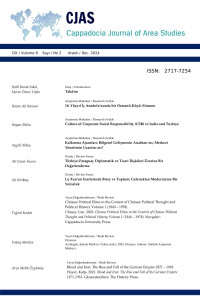Abstract
Kalkınma Ajansları, Avrupa Birliği’nin bölgeler arası sosyoekonomik eşitsizlikleri azaltma ve sürdürülebilir kalkınmayı teşvik etme hedefi doğrultusunda geliştirdiği önemli araçlardan biridir. Türkiye, AB üyelik süreci ve uyum politikaları kapsamında, 2006 yılından itibaren Kalkınma Ajanslarını hayata geçirerek bölgesel kalkınmayı desteklemeyi amaçlamıştır. Ancak Türkiye’deki Kalkınma Ajansları, kurumsal yapı, işleyiş ve merkeziyetçi yönetim anlayışı nedeniyle çeşitli zorluklarla karşılaşmaktadır. Merkezi yönetim ile yerel yönetimler arasındaki koordinasyon eksikliği, yerel kapasite yetersizlikleri ve ajansların bağımsız hareket edememesi, bu yapıların etkinliğini sınırlamaktadır.Bu çalışmada, Avrupa Birliği’nin Kalkınma Ajanslarına yönelik yaklaşımı ile Türkiye’deki uygulama süreçleri karşılaştırılmış ve Kalkınma Ajanslarının mevcut sorunları ele alınmıştır. Kalkınma Ajanslarının bölgeler arası gelişmişlik farklarını azaltmadaki rolü, yabancı sermayeyi çekme konusundaki etkinliği ve yerel kalkınma stratejilerindeki eksiklikler analiz edilmiştir. Ayrıca, ajansların insani kalkınma, sosyal eşitlik ve sürdürülebilirlik gibi temel hedeflere ulaşmada karşılaştığı sorunlar değerlendirilmiştir.Sonuç olarak, Türkiye’de Kalkınma Ajanslarının daha etkin bir şekilde çalışabilmesi için kurumsal bağımsızlıklarının artırılması, yerel dinamiklere dayalı bir yönetim modelinin benimsenmesi ve bölgesel ihtiyaçlara göre farklılaştırılmış stratejilerin geliştirilmesi gerektiği vurgulamıştır. Türkiye’nin bölgesel kalkınma hedeflerine ulaşabilmesi için Kalkınma Ajanslarının, yalnızca ekonomik büyüme değil, sosyal ve çevresel sürdürülebilirliği de gözeten bir anlayışla yeniden yapılandırılması büyük önem taşımaktadır.
References
- Atmaca, Yıldız, Sağır, Hayriye (2017). “Avrupa Birliği Bölgesel Politikası ve Türkiye: Kalkınma Ajansları Bağlamında Bir Analiz”, AÇÜ Uluslararası Sosyal Bilimler Dergisi, Cilt: 3, Sayı: 2, s.67-88.
- Çelik, Fatih (2017). “Bölgesel Kalkınma Ajansları’nın Sosyal Kalkınmaya Katkıda Katkısı: İzmir Kalkınma Ajansı (İZKA) Örneği”, Mehmet Akif Ersoy Üniversitesi Sosyal Bilimler Enstitüsü Dergisi, Cilt: 9, Sayı: 19, s. 148-170.
- EURADA (1997). Creation, Development and Management of RDAs: Does it Have to be So Difficult?,Cared Press.
- Peker, Kadir (2016). “Yerel Kalkınma Açısından Kalkınma Ajanslarının Rolü ve İşlevi Üzerine Bir Değerlendirme”, 1. Uluslararası Yerel Kalkınma ve Finansman Kongresi,s.235-243.
- Tahtalıoğlu, Hava, Özgür, Hüseyin (2016). “Türkiye’de Kalkınma Ajansları Politikasının Çözümlenmesi: Süreç Analizi (Aşamalar Yaklaşımı)”, Niğde Üniversitesi İktisadi ve İdari Bilimler Fakültesi Dergisi, Cilt: 9, Sayı: 3, s. 161-184
Abstract
Development Agencies are one of the important instruments developed by the European Union to reduce socio-economic disparities between regions and to promote sustainable development. As part of the EU accession process and harmonisation policies, Türkiye has been aiming to support regional developmentthrough the implementation of Development Agencies since 2006. However, Development Agencies in Turkiyeface several difficulties due to their institutional structure, functioning and centralised management approach. The lack of coordination between the central and local governments, the lack of local capacity and the agencies' inability to act independently limit the effectiveness of these structures. In this study, the European Union's approach to Development Agencies and the implementation processes in Turkiyeare compared and the current problems of Development Agencies are discussed. The role of Development Agencies in reducing interregional development differences, their effectiveness in attracting foreign capital and the deficiencies in local development strategies are analysed. In addition, the problems faced by the agencies in achieving key objectives such as human development, social equality and sustainability have been evaluated. In conclusion, it is emphasised that in order for Development Agencies in Turkiyeto work more effectively, their institutional independence should be increased, a management model based on local dynamics should be adopted and strategies differentiated according to regional needs should be developed. In order for Turkiyeto achieve its regional development targets, it is of great importance that Development Agencies are restructured with an understanding that takes into account not only economic growth but also social and environmental sustainability
Keywords
DevelopmentAgencies EU Harmonisation Centralisation Localisation Interregional Inequalities.
References
- Atmaca, Yıldız, Sağır, Hayriye (2017). “Avrupa Birliği Bölgesel Politikası ve Türkiye: Kalkınma Ajansları Bağlamında Bir Analiz”, AÇÜ Uluslararası Sosyal Bilimler Dergisi, Cilt: 3, Sayı: 2, s.67-88.
- Çelik, Fatih (2017). “Bölgesel Kalkınma Ajansları’nın Sosyal Kalkınmaya Katkıda Katkısı: İzmir Kalkınma Ajansı (İZKA) Örneği”, Mehmet Akif Ersoy Üniversitesi Sosyal Bilimler Enstitüsü Dergisi, Cilt: 9, Sayı: 19, s. 148-170.
- EURADA (1997). Creation, Development and Management of RDAs: Does it Have to be So Difficult?,Cared Press.
- Peker, Kadir (2016). “Yerel Kalkınma Açısından Kalkınma Ajanslarının Rolü ve İşlevi Üzerine Bir Değerlendirme”, 1. Uluslararası Yerel Kalkınma ve Finansman Kongresi,s.235-243.
- Tahtalıoğlu, Hava, Özgür, Hüseyin (2016). “Türkiye’de Kalkınma Ajansları Politikasının Çözümlenmesi: Süreç Analizi (Aşamalar Yaklaşımı)”, Niğde Üniversitesi İktisadi ve İdari Bilimler Fakültesi Dergisi, Cilt: 9, Sayı: 3, s. 161-184
Details
| Primary Language | Turkish |
|---|---|
| Subjects | Regional Studies, International Relations (Other) |
| Journal Section | Research Articles |
| Authors | |
| Publication Date | December 31, 2024 |
| Submission Date | November 18, 2024 |
| Acceptance Date | December 25, 2024 |
| Published in Issue | Year 2024 Volume: 6 Issue: 2 |


